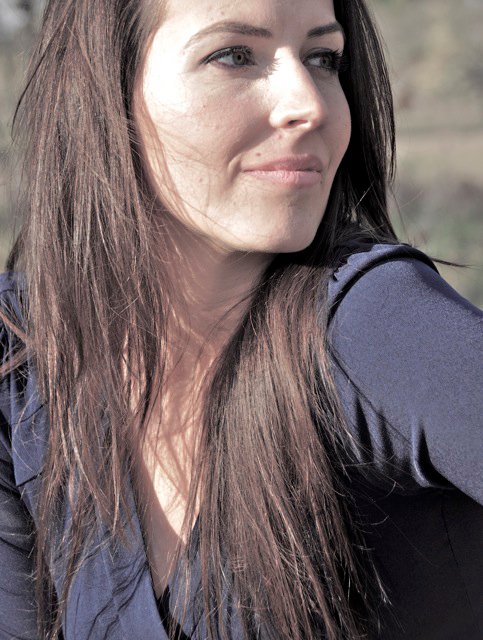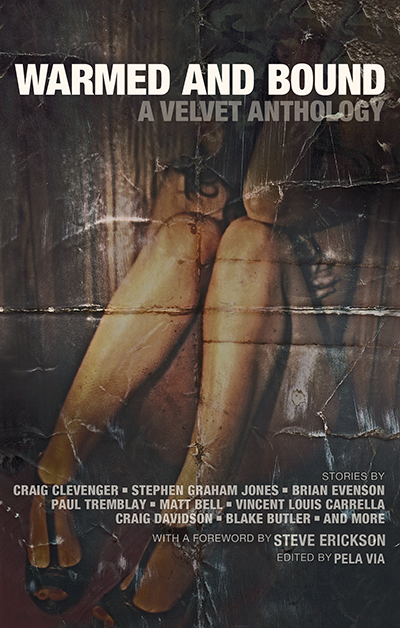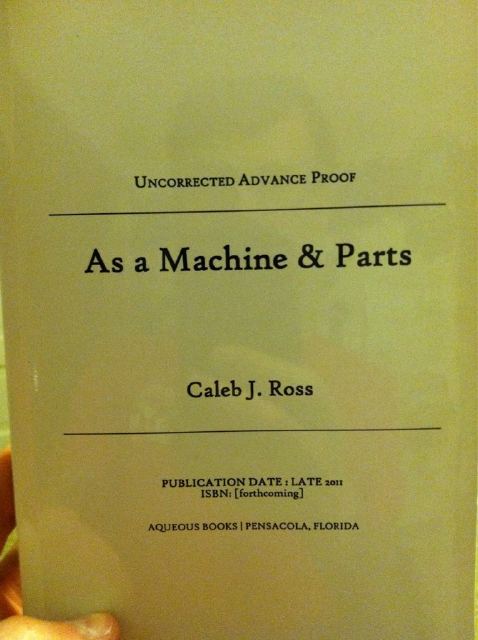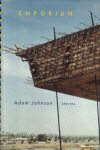Stranger Will tour stop #44: Pela Via’s blog
What follows is a conversation between myself and writer and Warmed and Bound editor, Pela Via. Why? We like chatting about ourselves. Or, read a much prettier version at Pela’s blog.
 |
 |
Pela Via: Thanks for talking to me again, Caleb. You are one of the hardest workers in contemporary fiction; I always love a chance to corner you into a long, stifling conversation. Are you as prolific as you seem?
Caleb J. Ross: Prolific is a term that seems appropriate at first, but really a better way to say it would be “got lucky all at once.” Stranger Will and I Didn’t Mean to be Kevin, the two 2011 novels, were both written a few years ago, each a year or so apart. And the novella also to be released this year, As a Machine and Parts, was written even later than the novels. This is all to say that I spent about eight years writing the books, but the one year release schedule implies otherwise. I’m actually quite the disappointment.
PV: Hardly. Your short work is everywhere. Do you plan to release any books in 2012?
CJR: As for 2012, nothing is contracted yet. But I have plenty to write.
PV: What do these two novels represent in your writing career?
CJR: The books both deal with parenthood, but from opposite angles. Stranger Will is about a parent not wanting his child. IDMtbK is about a child wanting nothing more than to have a parent. IDMtbK was written later, and I see it as a reaction to Stranger Will; it is both a personal goal (as in “now, let me see if I can to the opposite of what I just did”) and a reader-based goal (as in “I had better show readers that I’m not as crazy as Stranger Will would imply”).
PV: Do you feel more official this year, as a writer? I know it’s not your first book, but Stranger Will is your first published novel. Has it helped your ego?
CJR: The ego has taken a bit of a stroke, for sure. What makes me feel the most validated with Stranger Will is that I have a lot of strangers commenting on the book. With Charactered Pieces, my first book, I would say about 70% of the readers knew me personally. With Stranger Will that number seems significantly different.
PV: I’m frightened of reaching that place where my work is just barely popular enough to be reviewed by non-friends (and consequently panned).
CJR: I wouldn’t worry about having strangers review your work. I’ve found that the panning is about the same with strangers and friends. The difference being that friends tend to critique you as a person along with the work (“Wow, I can’t imagine you writing something like this”) whereas strangers tend to focus on the work itself.
PV: Interesting. So does it sting a bit more, then, when it comes from friends, if they have a complaint? Does it feel like they’re speaking to your general ability as a human and writer?
CJR: Most of my friends who read early drafts are writers themselves, so I understand that all intentions are good. That said, it can still sting. But the sting is more because of my passion for the work rather than my relationship to the reader.
* * *
CJR: You have lately been very heavily involved in compiling and editing Warmed and Bound, the first collection from The Velvet Press. What can readers expect?
PV: They can expect to be launched into some soulful Axel Taiari sci-fi, then through some beautiful though malformed father-son affection with our Caleb J. Ross story, and some curious sisterlove with Amanda Gowin, then deep into some sexy despondency with Matt Bell and a nostalgic look at love and acid with Gavin Pate—
That’s the first five stories, of thirty-eight. I do believe readers can expect to be moved in the sweetest of ways, and at times, to be touched a little inappropriately, in the sweetest of ways.
CJR: Do you anticipate any critical commentary regarding your editorial work? You seem to have embraced your role as an editor with considerable fervor and the entire Velvet community has embraced your work as well.
PV: You know, the possibility of criticism didn’t enter my mind till very recently. And it’s awfully frightening. Because, honestly, I was off my guard. Never once thought we’d see criticism. The project was born into an adoring crowd, and I knew without trying more or less what it needed to be—who it needed to be—to please its audience. But so much has changed. Many of the contributors will bring their own readers. So, yes. I’m worried now.
CJR: How will those outside the community see your editorial work?
PV: The editorial work is probably like a good font (or an effective stalker) in that it’s invisible. I don’t expect anyone to set down the book, all said and done, and marvel at the editing, not at all. As far as the reader knows, the stories were whole and hard from day one. And many were. Maybe half. Ideally, nobody but me will ever know which half.
CJR: Do you fear the collection being perceived as too insular and in turn not being received by those outside the Velvet community?
PV: Good question. It was originally meant to be insular; it was conceived as a love letter to The Velvet. Never expected wider appeal. But the enthusiasm—from what feels like every direction—has been startling. Amid a true passion project, it became apparent we have something that interests more than just ourselves. The reactions suggest we brought something fresh to the literary table. And knowing we did it without a trace of pretentiousness, that there’s a purity to it, alleviates some of my fear.
CJR: How did you approach your role as editor? You’ve been critiquing short fiction for a while but never with the end result of a bound collection.
PV: I believe I know this group and their work really well. So the objective was getting everyone to show off what they do that makes them special. Past that, editing is not something I think about. I know what I want a story to do to me.
CJR: Has editing a collection changed how you approach your own fiction?
PV: It’s nearly ruined it! For me, there’s a rivalry between left-brain and right-brain style thinking. I can’t create and fix at the same time.
* * *
PV: I know your promotion is pretty hardcore; I have to think that takes time. Is that your sole focus for now?
 CJR: Promotion has been my focus for sure. I haven’t written much fiction to speak of since late last year, aside from the story “Click-Clack,” which as you know will appear in Warmed and Bound. But, judging by your response to that story and the response from others I’m pretty happy with having my latest fiction be so well received. When I don’t write for a while, I start to fear that I’m losing any talent, like it slips away when not in use.
CJR: Promotion has been my focus for sure. I haven’t written much fiction to speak of since late last year, aside from the story “Click-Clack,” which as you know will appear in Warmed and Bound. But, judging by your response to that story and the response from others I’m pretty happy with having my latest fiction be so well received. When I don’t write for a while, I start to fear that I’m losing any talent, like it slips away when not in use.
PV: Well “Click-Clack” is definitely one of my favorites. And I stand by my original comment, that it’s a perfect short story. I think you do what you do really well.
CJR: I hope you are right. Your editorial reputation depends on it (smiley emoticon).
* * *
CJR: When will you have a full-length piece or collection out there? Are you thinking in terms of bound publication when you write?
PV: I despise writing short fiction. It’s not the medium for me. I hate thinking up a whole new world at each sitting and I’m dying to get back to full immersion in longer, more involved projects. So, to answer, now that I’m (almost) focused solely on my current novel again, I’m maybe a year from having something I’m ready to shop. Longer if the book doesn’t come together right; I’ll scrap a dozen novels before I publish something I don’t personally believe is excellent. Which is to say, I’ll keep chucking finished novels, as I’ve done the last few years.
CJR: I’m surprised to hear that take on short stories. You post your fiction at your blog.
PV: I post what I should more prominently refer to as ‘throw-away fiction.’ And the idea was to just to aim for a certain amount, just to get more writing between editing days, but it has not gone as planned and I hate it. My mind so rarely goes there, to flash, anymore.
CJR: You start over, fresh with a new blog, each year. I’m curious as to why you do this. Does it have something to do with your aversion to the short form?
PV: I tire of what I have to offer.
* * *
PV: Do you hope your child(ren) will read your work, at the appropriate age?
CJR: Yeah, I’ll let my son read my work if he wants. My hope is that he will have the same sensibilities with books as I do, in that he will be able to make the distinction between fiction and real life. I mean, he will know me better than anyone, so I would hope that he would know that Caleb J. Ross is not daddy, and daddy is not Caleb J. Ross.
* * *
PV: At what point did you decide As a Machine and Parts would be finished at novella length?
CJR: I knew from the beginning that As a Machine and Parts would be novella length. Since reading Mark Z. Danielewski’s House of Leaves I knew I had to try to merge the textual and visual somehow; I was just so impressed with what he did. My concept, a story of a man slowly turning into a machine, lacked the grandiosity of Danielewski’s irregular house and in turn lacks HoL’s 700+ pages.
PV: When and with what publisher is that one to be released?
CJR: As a Machine and Parts will be released in late 2011 from Aqueous Books (at the same time as I Didn’t Mean to be Kevin). I’ve had a great relationship with Aqueous over the past few months, and I’m excited to see what they do with the book.
PV: Do you have a favorite of your published works so far?
CJR: The commercially appropriate response would be “the next one.”
PV: Do you like experimental work?
CJR: I think the term “experimental” is too often used as a catch-all, mostly by the authors themselves, for work that hasn’t been honed and focused enough. Maybe that’s the experiment, to throw a bunch of words on a page and see how many readers fall for it. It’s a cruel experiment, one that devalues a lot of great fiction, I think. But, if used as a description for work that truly challenges traditional views of what literature should do, and there is evidence of thought and effort put into the work, then I am all about experimentation.
At its heart, experimental work is meta in nature, as its purpose is to highlight the fact that it is experimental, that it is not part of the established literary tradition. Taking this approach, experimental work is actually a fairly narrow genre, and in being so, its mileage will vary from author to author. I guess I just don’t see it done effectively often enough. An obvious outlier to this observation would be House of Leaves.
 PV: What authors have you been compared to?
PV: What authors have you been compared to?
CJR: I get Chuck Palahniuk a lot, I think because of our similar themes. Though, I think our writing style is quite a bit different. He tends to shock while providing somewhat superficial meaning, at least he has of late. Don’t get me wrong, I love his books, and specifically because of how he leverages the impact of superficiality.
PV: What is it you’re trying to do that is in contrast to this?
CJR: I think Palahniuk errs on the side of shock when he has opportunities to do much more. For example, with Snuff (which I really liked, by the way), he carries the pornified movie title idea to ridiculous lengths (pun intended), where he could have calmed that down and perhaps explored the motivation behind the names a bit. This could have merged nicely with the main theme, that of family, and allowed some exploration of name origins. But again, I love Palahniuk for what he does. Just because I try to distance myself from the comparisons doesn’t mean I don’t love what he does.
PV: What things, if any, have you vowed to never do as a writer?
CJR: I’ve never vowed against anything, officially, that I can recall. I’m pretty much open to anything. I’d love to try some hard genre fiction sometime. I’d love to publish ebook only stuff. I’d love to write an entire novel consisting of one sentence (like Vanessa Place’s Dies: A Sentence; there is nothing new under the son, I suppose). I guess my only real vow would be to never bore the reader.
PV: Do you think you’ll always help beginner writers?
CJR: Promoting other authors—the little guys or the big guys—will always be important to me. One of the reasons that being an author really intrigues me is the sense of cooperation and community. There isn’t any real competitiveness that I’ve experience so far. I’m a wuss; competition frightens me.
* * *
CJR: I’ve always been curious about how a writer sees her own work. Do you write, or have you ever written, with a specific author’s style in mind? Do you have a writer you would love to be compared to?
PV: I have a weird time finding others who do what I do, as I see it. Which suggests I keep my self-perception complicated to outsmart my own weaknesses… What I’d love is to reach a place where I can say audacious crap like ‘I write Pela Via fiction’ and have people nod like that’s a thing. Alas, not even I can keep a straight face with stuff like that.
CJR: So, how would you characterize what you do?
PV: I don’t know. As I get more serious about writing, I begin to think of my career as younger and younger (also, to spite my ass). I’ve lost the urgency to publish everything I produce and I no longer care much to categorize myself. It’s literary fiction, as store shelves go. Past that, I could take or leave any cool-sounding genre blends.
PV: What do you do? Grotesque Noir? Literary body horror? Other descriptions you like?
CJR: I’ve called it grotesque Noir, I’ve heard it called literary horror. I usually just refer to my fiction as Noir; that designation has a very wide net. Noir, as I see it, simply refers to a story wherein the protagonist starts morally conflicted, ends morally conflicted, and usually weaves through some sort of criminal life. The story isn’t so much the plot as it is an exploration of the protagonist’s reaction to the plot.
PV: Big sigh of relief from me—I will be delighted when everyone sees Noir as you described it there. It’s the fussiest label that nobody shuts up about. I like it till I’m using the term to make something sound important and conceptual and someone else uses Noir to mean rebellious, like we’re all flipping off our parents in story form. It’s like Punk Rock in that regard and I’ve gotten old.
* * *
PV: You’ve not been around The Velvet as much as you’ve gotten busier. Is it still a place to call home for you?
CJR: I have, unfortunately, been involved at The Velvet less lately than I would like. Mostly, that’s due to the aforementioned promotion. I’ll be back in full force soon enough. I’d love to get The Velvet Podcast on a more regular schedule.
PV: I’d love that. Do you think you’ll still be there 2-5-10 years from now?
 CJR: I hope so. The Velvet has become a home for me. It’s a rare thing—and I know, as I’ve been lurking and participating in various forums over the years—to know so many like-minded readers and writers to a level that the pre-Facebook meaning of “friend” has legitimate value. The drawback, of course, is that when a community becomes your only home, you tend to forget that other opinions exist. That can be dangerous for a writer.
CJR: I hope so. The Velvet has become a home for me. It’s a rare thing—and I know, as I’ve been lurking and participating in various forums over the years—to know so many like-minded readers and writers to a level that the pre-Facebook meaning of “friend” has legitimate value. The drawback, of course, is that when a community becomes your only home, you tend to forget that other opinions exist. That can be dangerous for a writer.
PV: Good point. Do you have experience with this, or examples? I fear it applies to me. My patience only goes so far, so I rarely stick around places that aren’t my kind of thing.
CJR: I may be more paranoid than my experience would justify. Perhaps I only feel like a community could become incestuous. Maybe my only specific example would be this dialog of ours; if you hated something I’ve written, would you let me know?
PV: Would you want me to let you know? Nobody has any business vocalizing that unless they get what you’re after, what you’re trying to accomplish in your work. In that respect, yes, I could easily pick apart something from you that I felt wasn’t at your potential.
CJR: Yes, I’d love to know.
PV: Well, I haven’t disliked anything of yours yet. I’ll remember you said this though.
* * *
CJR: You’ve been a member at The Velvet for a few years now. I remember when you first joined; you were embraced by the community much quicker than most new members. I credit this to your immediate and evident passion with the subject matter—dark fiction, Noir, writing, etc. What do you think when you look back on your first days at The Velvet?
PV: Actually, I’ve since had a couple people tell me they disliked me and avoided me, because of the way others seemed to take to me. And my experience felt completely different. Everyone’s kind on the Velvet, but they are not impressed easily. And I very rarely have anything substantial to offer in half the conversations. So yeah, passion’s high for me, but ‘I totally love …’ posts over and over don’t get a girl very far, especially among people where some likes are assumed on entry. So, if people were embracing me, it was because I would address them directly whenever I had a question or comment, through PMs or email. There’s just no such thing as popular in my world; you’re either connected to people as individuals or you’re not.
CJR: I love that sentiment.
* * *
PV: Has your writing changed its direction or style in the last 2-5 years?
CJR: Honestly, I don’t think so. My writing has become much more concise, I think (my responses to your questions not withstanding). But in terms of style and theme, I’m still an author of grotesque Noir. I have noticed a tendency to try more things, though never do I abandon existing thematic conventions.
PV: How do you fall on the commercial/artistic spectrum? You make a solid effort to gain and keep your readers, and you sell books, so I see some commercial viability. Where does integrity come in for you?
CJR: Integrity is extremely important to me. I take seriously how I am perceived by readers, at least in terms of the “sell out” label.
PV: If your publisher is offering some real cash for something you wouldn’t otherwise take? How far will you bend to obtain mass market appeal?
CJR: Now, I’ve never been offered a huge amount of money to write something that wasn’t entirely mine, so I don’t know how exactly I would react. Probably by throwing a ridiculous party.
PV: Good idea.
Thanks Caleb. Always a pleasure, tricking you to catch up with me. (a whole row of emoticons!)

